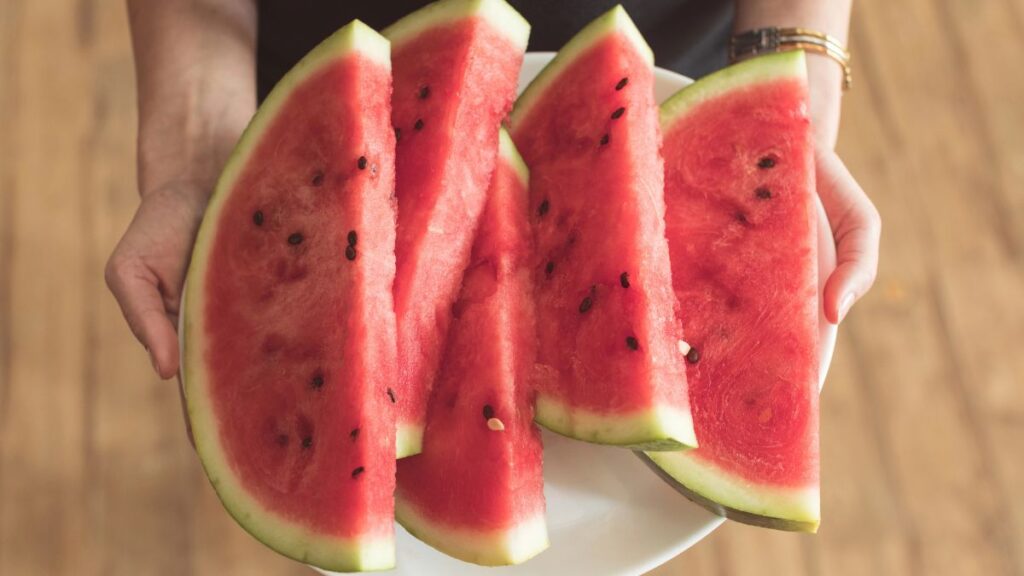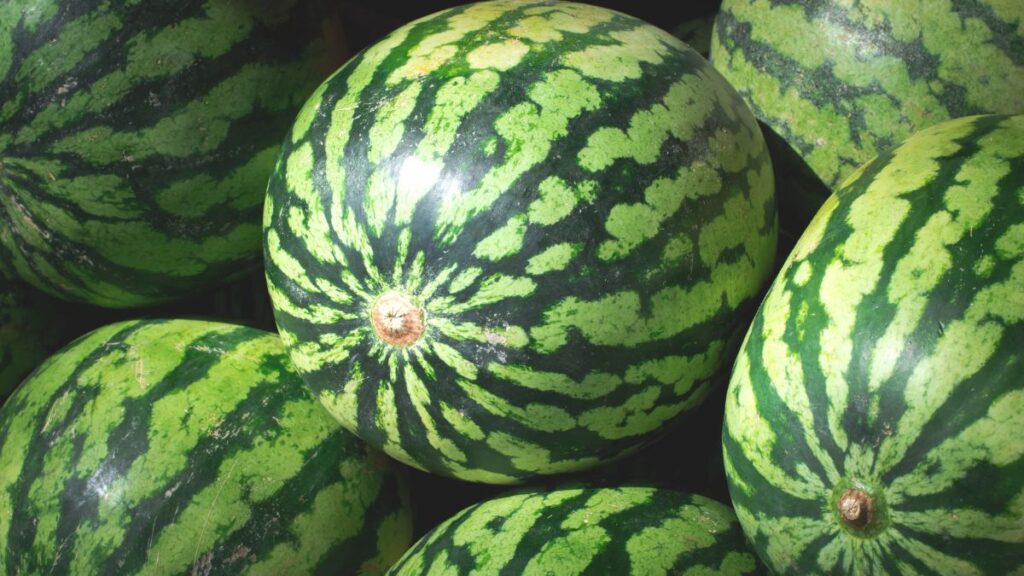15 Amazing Benefits of Eating Watermelon Every Day
Watermelon is not just a refreshing summer treat—it’s packed with nutrients and health benefits that make it worth eating every day. From keeping you hydrated to boosting your immune system, watermelon is more than just a tasty snack. It’s rich in vitamins, antioxidants, and water content, making it a versatile fruit that can support various aspects of your health.
Whether you’re looking for a natural way to cool down, improve digestion, or even enhance your skin, watermelon has something to offer. Here are 15 reasons why you should consider adding this delicious fruit to your daily diet.
Keeps You Hydrated

Watermelon is made up of about 92% water, making it an excellent way to stay hydrated. Eating watermelon regularly can help you meet your daily water needs, especially during hot weather. Proper hydration is essential for maintaining energy levels, keeping your skin healthy, and supporting overall bodily functions.
Since it’s low in calories but high in water, watermelon is a great way to quench your thirst without feeling bloated. Its natural sweetness makes it more appealing than plain water, encouraging you to eat more of it.
Boosts Immune System

Watermelon is rich in vitamin C, a powerful antioxidant that helps boost your immune system. Eating it daily can help your body fight off infections, reduce the risk of colds, and promote quicker healing. Vitamin C also plays a role in collagen production, which is essential for skin health and wound healing.
Adding watermelon to your diet can give your immune system the extra support it needs, especially during flu season. The refreshing taste of watermelon makes getting your daily dose of vitamin C both easy and enjoyable.
Supports Heart Health

Watermelon contains a compound called citrulline, which helps improve blood flow and may reduce blood pressure. Citrulline works by relaxing the blood vessels, making it easier for blood to circulate through your body. Eating watermelon regularly can support cardiovascular health and lower the risk of heart disease.
The fruit is also rich in antioxidants like lycopene, which has been shown to reduce inflammation and protect against heart problems. With its heart-healthy properties, watermelon is an easy addition to any diet focused on long-term wellness.
Aids in Weight Loss

If you’re looking to lose weight, watermelon is a perfect low-calorie snack to satisfy your sweet cravings. Its high water content helps you feel full, reducing the temptation to overeat. Since watermelon is naturally low in fat and calories, it can be eaten in larger portions without guilt.
The fiber in watermelon also helps improve digestion and keeps you feeling satisfied longer. Incorporating watermelon into your meals can make sticking to a healthy eating plan easier and more enjoyable.
Improves Digestion

Watermelon contains a small amount of fiber, which, combined with its high water content, helps promote healthy digestion. Eating watermelon regularly can prevent constipation and keep your digestive system functioning smoothly. The fiber helps add bulk to your stool, while the water softens it, making it easier to pass.
Proper hydration also plays a key role in digestion, and watermelon’s water content supports the movement of food through the intestines. Whether eaten as a snack or part of a meal, watermelon is a gentle and natural way to improve digestive health.
Protects Your Skin

Watermelon is rich in antioxidants like vitamins A and C, which are essential for skin health. Vitamin C promotes collagen production, helping your skin stay firm and youthful, while vitamin A helps repair skin cells and improve your complexion.
Eating watermelon daily can give your skin a healthy glow and may even protect it from sun damage. Lycopene, another antioxidant found in watermelon, also helps defend your skin against the harmful effects of UV rays. The combination of hydration and antioxidants makes watermelon a beauty-boosting food.
Promotes Muscle Recovery

Watermelon contains amino acids like citrulline, which help reduce muscle soreness and promote recovery after exercise. Citrulline improves blood flow and delivers oxygen to muscles, helping them recover more quickly. Eating watermelon or drinking its juice after a workout can relieve muscle fatigue and improve endurance.
It’s a natural and hydrating way to aid in recovery without the need for supplements. If you’re active or working on building strength, adding watermelon to your post-workout routine is a smart move.
Good for Eye Health

Watermelon is a great source of beta-carotene, which the body converts into vitamin A, a nutrient essential for good vision. Regular consumption of watermelon can help protect your eyes from age-related issues like macular degeneration.
Vitamin A also helps keep your eyes moist and prevents dry eye syndrome. The antioxidants in watermelon may reduce the risk of cataracts and improve overall eye health. Including watermelon in your diet can help you maintain sharp vision as you age.
Reduces Inflammation

The antioxidants found in watermelon, particularly lycopene, are known to reduce inflammation in the body. Chronic inflammation is linked to several diseases, including heart disease, cancer, and arthritis. Eating watermelon daily can help lower inflammation and support overall health.
Lycopene also has anti-inflammatory effects that protect your body’s cells from damage. Adding watermelon to your meals is an easy and delicious way to keep inflammation in check and improve your long-term well-being.
Supports Kidney Function

Watermelon’s high water content and natural diuretic properties help flush toxins from the body and support kidney function. Eating watermelon regularly can prevent kidney stones and reduce the strain on your kidneys by promoting urination.
The potassium in watermelon also helps regulate fluid balance and reduces the risk of kidney-related problems. By keeping your kidneys healthy and hydrated, watermelon can contribute to better overall organ function. It’s a natural and refreshing way to protect your kidneys.
Rich in Antioxidants

Watermelon is loaded with antioxidants like lycopene, beta-carotene, and vitamin C, which help protect your cells from damage caused by free radicals. Free radicals can lead to oxidative stress, contributing to aging and diseases like cancer and heart disease.
By eating watermelon daily, you can help your body fight off these harmful effects. Antioxidants play a key role in preventing inflammation and boosting overall health. Watermelon’s rich antioxidant content makes it a powerful food for maintaining youthful energy and well-being.
Enhances Brain Function

Watermelon contains several important nutrients that support brain health, including vitamin B6, which helps produce neurotransmitters like serotonin and dopamine. These neurotransmitters regulate mood, sleep, and cognitive function.
Eating watermelon can improve your focus and memory while also promoting a positive mood. The antioxidants in watermelon also protect brain cells from oxidative stress, which can lead to cognitive decline over time. Adding watermelon to your diet can help keep your mind sharp and your mood balanced.
Balances Blood Pressure

The potassium and magnesium in watermelon help regulate blood pressure levels, making it a great addition to the diet for people with high blood pressure. Potassium works by neutralizing the effects of sodium, which can lead to lower blood pressure.
The citrulline in watermelon also promotes blood vessel relaxation, improving circulation and further helping to control blood pressure. Including watermelon in your meals can help maintain a healthy cardiovascular system. It’s a simple and tasty way to keep your blood pressure in check.
Supports Weight Management

Because watermelon is low in calories and high in water, it’s an ideal snack for those looking to manage their weight. Its sweet taste can satisfy cravings without contributing to excess calorie intake.
The fiber and water content in watermelon also help keep you full, reducing the temptation to snack on unhealthy options. Eating watermelon can help you maintain a healthy weight while enjoying a naturally sweet treat. It’s a guilt-free way to stay on track with your fitness goals.
Boosts Mood

Watermelon contains B vitamins, such as B6, which play a role in brain function and the production of mood-regulating hormones. Eating watermelon can help improve your mood, reduce stress, and increase energy levels.
Its hydrating properties also contribute to mental clarity and focus. The natural sugars in watermelon provide a quick energy boost, making it a great snack when you’re feeling low. Adding watermelon to your daily diet can help lift your spirits and keep you energized throughout the day.
15 Places Where You’re Expected to Tip—But You Really Don’t Have To

Tipping has become a widespread practice in many industries, with the expectation that you’ll leave a little extra for good service. However, not every situation truly warrants a tip, even if you feel pressured to give one.
15 Places Where You’re Expected to Tip—But You Really Don’t Have To
15 Most Annoying Habits of American Tourists When Dining Abroad

Traveling abroad is an exciting adventure, and dining in new places is a big part of the experience. However, some common behaviors by American tourists can be frustrating for locals and affect the dining experience.
15 Most Annoying Habits of American Tourists When Dining Abroad







